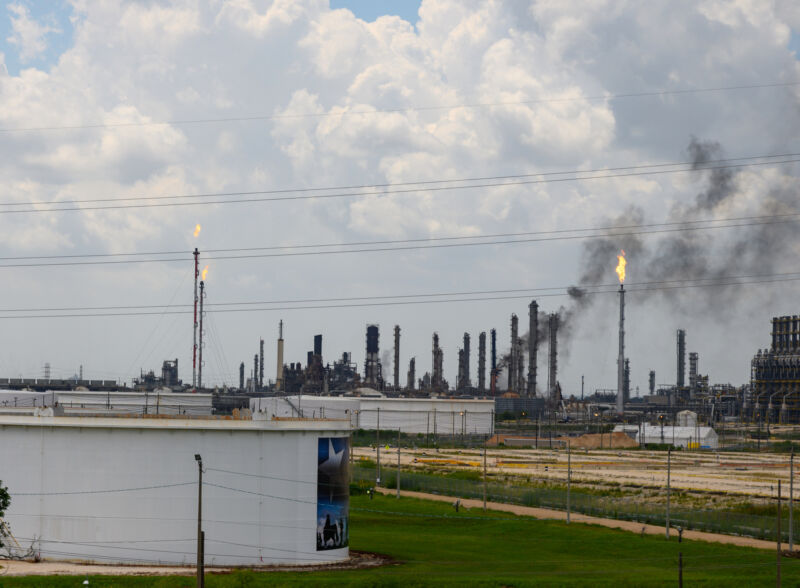
Enlarge / At some point, this must stop. A recent congressional hearing left us no closer to figuring out when that point will be reached.
Thursday, the House Committee on Oversight and Reform held hearings on the role of oil companies in fostering our present climate crisis. The companies led by these executives have a long history of playing down the risks of climate change, leading a number of House Democrats to suggest that this hearing could be the equivalent of the 1994 hearings with tobacco executives, in which the executives denied well-established scientific data on the addictiveness of nicotine.
But that expectation was doomed to disappointment. Oil companies, after all, had already demonstrated that they are happy to accept the science of climate change when under oath; they just tend to spin the details of their own role in influencing public perceptions of that science. Congress was treated to a repeat performance of that sort that neatly avoided the kind of catastrophic failure in public perception that the tobacco company executives produced.
However, the hearing did manage to highlight the gap between what many companies are saying now and the reality of what society has determined it needs to accomplish. What follows is less a recap of the testimony and more of an analysis of how the companies’ spin brought them to their current circumstances—and where they’ll go from here.
Why we’re here
It’s now well-established that Exxon employed scientists who looked into the issue of climate change decades ago and came to the same conclusions as mainstream science did. But even as that information percolated internally, the company’s executives were casting doubt on those findings.
This is where their paths diverged from those of tobacco executives. Over time, the rhetoric of oil companies shifted so that they no longer directly contested the science. Instead, Exxon provided funding to organizations that attack climate science, such as the Heartland Institute. Others funded the organization in a more roundabout way, through contributions to the American Petroleum Institute (API), which then provided funding to Heartland. Obviously, the API did many other things on behalf of oil companies, providing a useful layer of abstraction between the companies and climate change denialism.
That funding ended up serving two purposes. First, it continued the circulation of unjustified uncertainties regarding the strength of the scientific evidence, and company executives could reference that uncertainty in statements. Second, it allowed the executives to publicly acknowledge some aspects of climate science while remaining assured that the lobbying the companies had funded would continue to prevent any concrete action based on that science.
Thursday’s hearings saw these factors come out in both dramatic and subtle ways. Exxon’s CEO, Darren Woods, was challenged on a statement by a former company CEO who assigned climate science an uncertainty his own scientists said it lacked. But Woods denied any contradiction because he was able to point to a different part of the same statement in which the CEO said that we should probably do something about climate change.
All the executives were careful to note that they accepted that humanity “contributes” to climate change. Given that recent Intergovernmental Panel on Climate Change reports have concluded that essentially all the warming in the past century is due to human activities, this is a subtle way to undercut scientific conclusions while appearing to sound reasonable. Unfortunately, nobody called the executives on the tactic. But Committee Chair Carolyn Maloney did note the companies’ past funding of climate change denialism and asked the executives to pledge that they would not do it again in the future. A grand total of zero executives were willing to make that pledge.
By contrast, all of them happily pledged to keep producing energy when prompted by a Republican committee member.
The awkward present
The promise to keep producing fossil fuels nicely illustrates the difficult set of circumstances that the oil companies’ past stalling has left them and the public in. To an extent, we’re all now the victims of their past successes.
The inaction the oil companies helped promote has ensured that we’re now decades behind on reducing our carbon emissions. As a result, achieving international goals on emissions means that some of the known oil reserves that form the foundation for the companies’ value will actually have to stay in the ground. Put differently, if we want to keep warming below 2° C, some of the oil companies’ assets will end up being worthless, and they’ll need to start reducing production tomorrow.
The companies are only now starting to take halting steps to acknowledge that fact. Shell intends to stop searching for new deposits in 2025. It is investing in renewables, and it plans to lower its production—but at a pace that’s not fast enough to meet goals set out in the Paris Climate Agreement. Only BP plans to reduce production at a pace that is consistent with Paris; Exxon has no plans for reducing production, and Chevron actually plans to increase it.

